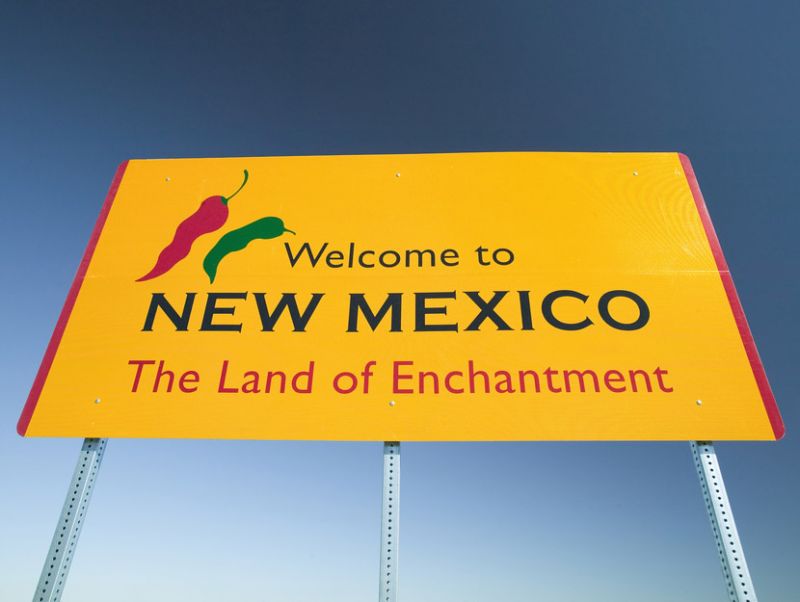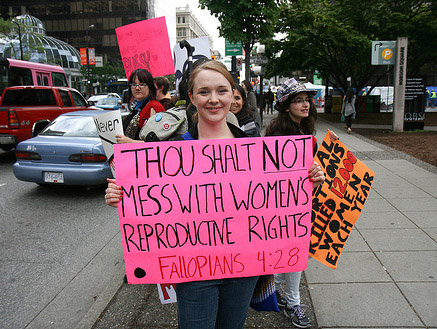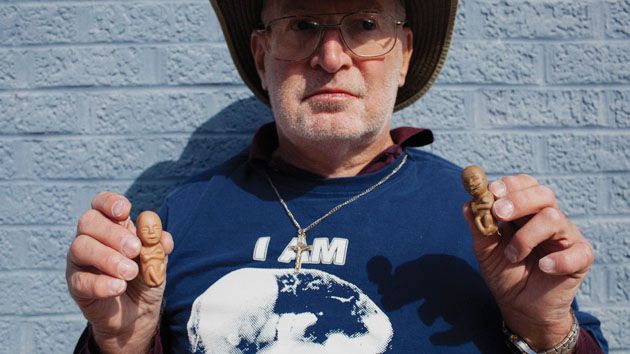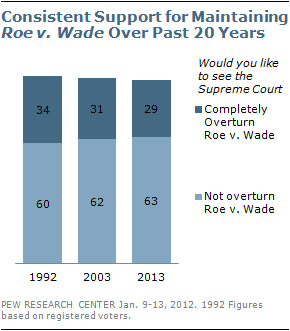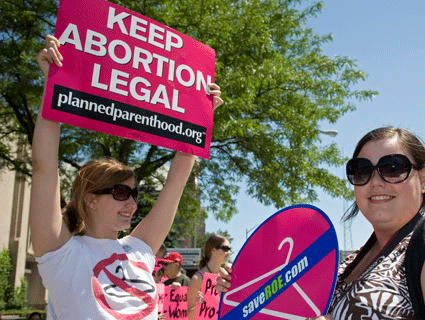
Jim West/ZUMAPress
Last Tuesday marked the 40th anniversary of Roe v. Wade, the Supreme Court decision that affirmed a constitutional right to abortion in the United States. As the case heads into middle age, a new survey from the Pew Forum on Religion & Public Life found that only 44 percent of people between the ages of 18 and 29 could correctly identify what Roe was even about.
But survey results like that one only tell part of the story. The fact that many young adults can’t correctly identify a particular Supreme Court case shouldn’t be taken as a sign that millennials—the generational term commonly used for anyone between the ages of 18 and 30—don’t care about reproductive rights. (After all, some of our elected officials can’t identify any Supreme Court cases.) Millennials’ actual beliefs about abortion policy matter more than their ability to identify Roe. On that subject, the poll results are clear: 68 percent of 18- to 29-year-olds believe that women should have a right to access abortion—the highest support in any age bracket other than the baby boomers.
Any group that wants to influence policy in the long run, though, will have to find a way to motivate millennials: There are 80 million of them, and by 2020 they’ll make up 40 percent of the voting population. But millennials don’t think about reproductive rights in the same way their parents did. Polling by NARAL Pro-Choice America, a top reproductive rights group, has found that although the majority identify as “pro-choice,” only about 21 percent are actively advocating for or working on the issue. “It is, in my judgment, a tipping point for this issue,” Nancy Keenan, the group’s president, told me in an interview earlier this month. “They are pro-choice, but [we need to] connect that to the importance of the political.”
The need to engage the next generation of voters on this issue is part of the reason that Keenan, who is 60, announced last year that she is stepping down at NARAL in order to make way for a younger leader. Keenan plans to leave in February, and will be replaced by Ilyse Hogue, who is in her early 40s. “I felt, and my board felt, this was an opportunity, at 40 years of Roe, for me to make room for new leadership, and an opportunity for a new leader to engage this generation of millennials,” Keenan says.
At 36, Kierra Johnson, the executive director of Choice USA, is one of the few leaders of a national reproductive rights group who was born after Roe. She shares Keenan’s ambitions about connecting with the next generation.
Choice USA aims to organize college students to fight for reproductive rights, and to that end, it works with 25 campus groups in six states, including Texas and Kansas, where abortion rights have been under attack in recent years. But it can be tough to organize young people to back a reproductive rights agenda if you don’t understand that they’re coming at the issue from a new angle, Johnson says. For one, it’s harder to get young people fired up about maintaining a right they already have. Compared to an issue like marriage equality, where activists are working proactively for something new, reproductive rights groups “have to organize around battles that have technically already been won,” Johnson says. “Didn’t we already get access to contraception? Didn’t we already get access to abortion?” she continued. “It’s like, yeah, but…either it’s been rolled back in some way, or the context has changed.”
Another difference, Johnson says, is that many of the young people she works with at Choice USA want to talk about safe sex, positive relationships, or contraception—not abortion. She also finds that a number of them don’t self-identify as “pro-choice,” even if they are in practice. “In our introductory program, we don’t even make people identify as ‘pro-choice’,” Johnson says. “Because you lose people. You just have to have an interest, and you have to be open-minded.” That’s the reasoning behind Planned Parenthood’s recent announcement that it, too, is shedding the pro-choice label—a recognition, the group says, of the fact that abortion is an issue where “labels don’t reflect the complexity.”
Millennials also seem to like highlighting personal stories about women’s experiences with accessing abortion. This is what prompted Advocates for Youth, another reproductive rights group, to launch its “1 in 3 Campaign,” a project highlighting the personal stories about abortion. The group bills the campaign, which is based on the statistic that 1 in 3 women will have an abortion at some point in her life, as an effort to move beyond the question of whether abortion should be legal to begin talking about how to reduce its stigma going forward. “Over the next 40 years, we see this generation as the one that will be the linchpin of the abortion access movement,” says Julia Reticker-Flynn, manager of the Youth Activist Network at Advocates for Youth. “Then it was about legality, now it’s about access. Even if it’s legal, if it’s inaccessible, is it really even an option?”
Some worry that a younger generation of activists might take the rights their mothers and aunts and grandmothers won for granted. But that possibility is something to celebrate, Keenan says. “My generation fought so that the next generation of women wouldn’t have to worry about this, think about this, care about this,” she says. “You could almost say we did our job. They don’t think about it because for most of them it is available to them.”
That sense of hard-won victory is an opportunity, Choice USA’s Johnson says: “I think we’re at a place where we have to spend a little less time looking back than looking forward. What about the next 40 years?”
